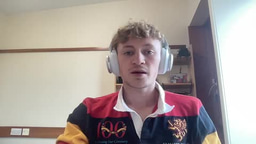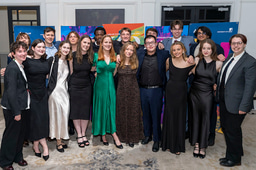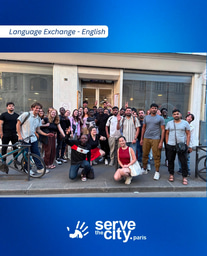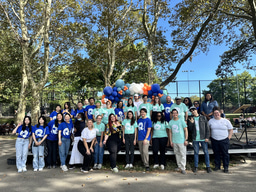As I come to the end of my Laidlaw Scholarship, I’ve been reflecting on how much I’ve learnt about what it means to lead ethically and think globally. The past two years have taken me from lab work and data analysis sessions to community health clinics in New York City, but across these very different environments, the same questions have kept resurfacing. How can research and leadership serve others responsibly? How do we ensure that the knowledge we generate or the projects we build truly include the people they aim to help? What does it mean to truly be a global citizen?
These questions have guided both parts of my Laidlaw journey: my research with Dr. Paddy Ross on auditory dominance in children in the first summer, and my recent summer internship with the New York based non-profit Raising Health. Together, these experiences have shaped the way I understand ethical leadership and global citizenship. My journey with Laidlaw and the Oxford Character Project first introduced me to these concepts as abstract ideals, but I now see them as active, everyday practices rooted in empathy, integrity, and curiosity.
During my research phase, I worked with Dr. Paddy Ross to investigate how children integrate information from different senses; specifically, whether they rely more on what they hear or what they see when the two conflict. This phenomenon (known as sensory dominance) has long been observed in adults, but our project aimed to refine the timeline for when and how this dominance changes across childhood. After months of designing stimuli, testing participants, and analysing data, we found that children tend to show auditory dominance when tested with emotionally meaningful stimuli. Adults, on the other hand, trend more towards visual dominance. My submitted Laidlaw research project served as the first draft of our paper, which has now been submitted for publication - a milestone that feels both surreal and incredibly exciting.
Beyond the technical skills I gained in experimental design and data interpretation, this project taught me something more enduring about ethical research and leadership. Working with children meant being constantly aware of power dynamics, consent, and care, ensuring that participation was positive, respectful, and voluntary at every stage. I learned that ethical leadership in research isn’t just about following protocols; it’s about creating an environment where others feel safe, valued, and understood. In another sense, the project itself was about understanding how people perceive the world differently. Every child processed sensory information in their own way, reminding me that diversity isn’t a complication to be solved but a reality to be embraced. That lesson was carried with me into the next phase of my scholarship.
The transition from a university research setting to the diverse, multilingual neighbourhoods of New York City couldn’t have been more striking. At RaisingHealth, I joined a team working to make healthcare more accessible for immigrant communities facing barriers like language differences, documentation status, and lack of insurance. During my six weeks there, I split my time between the mental health team and the community health team. I helped design outreach materials for new group therapy programmes, including a therapy group for Mandarin speaking community members, and co-facilitated sessions under the guidance of a licenced clinical social worker. During these sessions I witnessed first-hand how fostering an open, inclusive environment can open doors for individuals who might otherwise be excluded from support. Outside of mental health, I helped distribute culturally tailored food parcels to families across the city and supported the team in organising Raising Health’s 10th Annual Health Empowerment Celebration, which provided over 1000 community members with free health screenings, food, and access to social services.
What I learned most from this experience is that ethical leadership starts with listening. Whether designing materials or engaging directly with community members, I saw how real impact depends on humility, on stepping back and letting those with lived experience lead the conversation. The people I met didn’t just need services; they needed to be seen, heard, and respected on their own terms. For leadership to be successful, it must be based on honest and open communication. RaisingHealth taught me to let community voices lead and showed me that leadership is always a collaborative effort.
Global citizenship, I realised, isn’t just about crossing borders; it’s about building bridges of understanding wherever you are. In the Raising Health office, we shared stories and laughter over experiences from every corner of the world. Culture-swapping became its own form of learning: a reminder that community is built through connection, not just coincidence.
The Laidlaw Scholarship has shown me that ethical leadership isn’t about holding authority, but about using influence responsibly. It’s about making decisions with empathy and foresight, ensuring that the pursuit of progress never comes at the expense of people’s dignity or autonomy. Going forward, I want to carry these lessons into everything I do, whether in healthcare, research, or policy. I hope to keep centring equity and accountability in my work, always asking who benefits from a decision and who might be left out. I also plan to stay engaged with global health initiatives that prioritise local leadership, recognising that sustainable solutions must be co-created, not imposed. Most of all, I’ve learned that ethical leadership and global citizenship are less about grand gestures than about everyday choices. We must make the choice to listen before speaking, to seek understanding before judgement, and to act with integrity even when no one is watching. As I close this chapter of the Laidlaw Scholarship, I feel grateful for all that I’ve learnt over the past two years. From studying how children make sense of the world to working with communities striving for better access to care, I’ve learned that leadership, at its best, is a form of service. I hope to take forward these lessons to be a better leader and a true global citizen in the future.





Please sign in
If you are a registered user on Laidlaw Scholars Network, please sign in